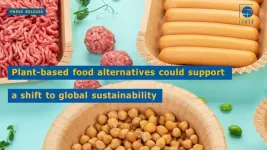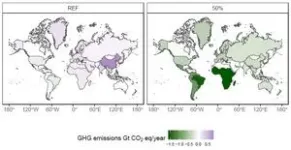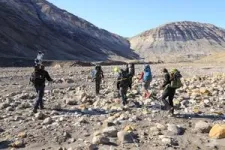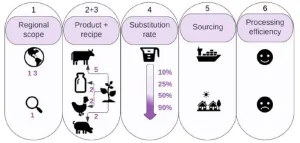(Press-News.org)
Replacing 50% of meat and milk products with plant-based alternatives by 2050 can reduce agriculture and land use relatedgreenhouse gas (GHG) emissions by 31% and halt the degradation of forest and natural land, according to new research.
According to the study just published in Nature Communications, additional climate and biodiversity benefits could accrue from reforesting land spared from livestock production when meat and milk products are substituted by plant-based alternatives, more than doubling the climate benefits and halving future declines of ecosystem integrity by 2050. The restored area could contribute up to 25% of the estimated global land restoration needs under Target 2 of the Kunming Montreal Global Biodiversity Framework by 2030.
“We’ll need much more than ‘Meatless Mondays’ to reduce the global GHG emissions driving climate change—and this study shows us a path forward,” said study co-author Eva Wollenberg of the University of Vermont (UVM). “Plant-based meats are not just a novel food product, but a critical opportunity for achieving food security and climate goals while also achieving health and biodiversity objectives worldwide. Such transitions are challenging and require a range of technological innovations and policy interventions.”
The study, by researchers at UVM, the International Institute for Applied Systems Analysis (IIASA), the Alliance of Bioversity International, and CIAT, is the first to look at the global food security and environmental impacts of plant-based meat and milk consumption at large scales that considers the complexity of food systems.
“Understanding the impacts of dietary shifts expands our options for reducing GHG emissions," said study lead author Marta Kozicka, a researcher from IIASA. “Shifting diets could also yield huge improvements for biodiversity.”
The authors found that a 50% substitution scenario would substantially reduce the mounting impacts of food systems on the natural environment by 2050. Compared to 2020, the impacts would include:
Global agricultural area declines by 12% instead of expanding.
The decline in areas of forest and other natural land is almost completely halted.
Nitrogen inputs to cropland are nearly half of the projections.
Water use declines by 10% instead of increasing.
Without accounting for any carbon sequestration on spared land, GHG emissions could decline by 2.1 Gt CO2eq year-1(31%) in 2050 (1.6 Gt CO2eq year-1 on average in 2020–2050).
Undernourishment globally declines to 3.6%, as compared to 3.8% in the reference scenario (reducing the number of undernourished people by 31 million).
The authors developed scenarios of dietary changes based on plant-based recipes for beef, pork, chicken, and milk. These recipes were designed to be nutritionally equivalent to the original animal-derived protein products and realistic for the existing food manufacturing capabilities and globally available production ingredients.
To ensure relevance and as a potential user of the findings, the research team solicited input from Impossible Foods, a company that develops plant-based substitutes for meat products. The company provided generic recipes for the plant-based meat substitute products used in the analysis. The science team had complete control over decision-making for this peer-reviewed study, and the data are not specific to Impossible Foods.
The full environmental benefit of diet shifts can be achieved if the agricultural land spared from livestock and feed production is restored through biodiversity-minded afforestation. In the 50% scenario, the benefits from reduced land-use emissions could double as compared to a scenario without afforestation – a total reduction of 6.3 Gt CO2eq year-1. The 50% substitution scenario would reduce predicted declines in ecosystem integrity by more than half.
“While the analyzed dietary shifts serve as a powerful enabler for reaching climate and biodiversity goals, they must be accompanied by targeted production side policies to deliver their full potential. Otherwise, these benefits will be partly lost due to production extensification and resulting GHG and land-use efficiency losses,” explains IIASA Biodiversity and Natural Resources Program Director Petr Havlík.
While the results support the increased use of plant-based meat substitutes, the authors recognize that livestock are a valuable source of income and nourishment for smallholders in low- and middle-income countries, and have significant cultural roles, reduce risk, and diversify smallholder income. Simultaneously, climate change threatens the livelihoods of smallholder farmers. Rapid policy and management action to avoid environmental risk and support farmers and other livestock value chain actors for a socially just and sustainable food system transition will therefore be crucial. This is particularly important considering recent setbacks to achieving food security globally.
According to the study, impacts across regions could differ due to differences in population size and diets, unequal agricultural productivity, and participation in international trade of agricultural commodities. The main impacts on agricultural input use are in China and on environmental outcomes in Sub-Saharan Africa and South America. These regional differences could also be used to design better interventions.
“The food sector produces roughly one third of global GHG emissions—and has been notoriously difficult to de-carbonize,” said Wollenberg, a researcher at UVM’s Gund Institute for Environment, the Rubenstein School of Environment and Natural Resources, Alliance of Bioversity International, and CIAT. “Given the magnitude of benefits we show from substituting meat with plant-based alternatives for global sustainability, climate action, and human health, this research provides important food for thought for consumers, food producers, and policymakers.”
END
About The Study: In this study of prospectively collected data of 49,000 adults age 60 or older participating in the UK Biobank, more time spent in sedentary behaviors was significantly associated with higher incidence of all-cause dementia. Future research is needed to determine whether the association between sedentary behavior and risk of dementia is causal.
Authors: David A. Raichlen, Ph.D., of the University of Southern California in Los Angeles, is the corresponding author.
To access the embargoed study: Visit our For The Media website at this link https://media.jamanetwork.com/
(doi:10.1001/jama.2023.15231)
Editor’s ...
A major study published in JAMA led by researchers at Karolinska Institutet suggests that a possible cause of spontaneous brain haemorrhage could be transmitted via blood transfusion. At the same time, it is very unlikely that anyone should suffer a brain haemorrhage after receiving donated blood.
A common cause of spontaneous, recurring brain haemorrhages is the vascular disease cerebral amyloid angiopathy (CAA), in which proteins accumulate along the tiny blood vessels of the brain. Several studies have shown that CAA can be transferred from one individual ...
About The Study: This meta-analysis including individual participant data from 34,000 older adults in 17 studies found that antihypertensive use was associated with decreased dementia risk compared with individuals with untreated hypertension through all ages in late life. Individuals with treated hypertension had no increased risk of dementia compared with healthy controls.
Authors: Matthew J. Lennon, M.D., of the University of New South Wales in Sydney, Australia is the corresponding author.
To access the embargoed study: Visit our For The Media website at this link https://media.jamanetwork.com/
(doi: 10.1001/jamanetworkopen.2023.33353)
Editor’s ...
·Stress heightens risk for many psychiatric disorders·Finding opens new avenue for drug development to treat psychiatric disorders
·Amygdala releases endogenous cannabinoid molecules under stress
·Finding opens new avenue for drug development to treat psychiatric disorders
CHICAGO --- When you are under stress, your brain may release its own cannabinoid molecules to calm you down, activating the same brain receptors as THC derived from cannabis plants.
But the brain activity patterns and neural circuits that are regulated by these brain-derived ...
Adults aged 60 and older who spend more time engaging in sedentary behaviors like sitting while watching TV or driving may be at increased risk of developing dementia, according to a new study by USC and University of Arizona researchers.
Their study showed the risk of dementia significantly increases among adults who spend over 10 hours a day engaging in sedentary behaviors like sitting — a notable finding considering the average American is sedentary for about 9.5 hours each day.
The study, published on Tuesday, September 12 in ...
Replacing 50% of meat and milk products with plant-based alternatives by 2050 can reduce agriculture and land use related greenhouse gas (GHG) emissions by 31% and halt the degradation of forest and natural land, according to new research.
According to the study just published in Nature Communications, additional climate and biodiversity benefits could accrue from reforesting land spared from livestock production when meat and milk products are substituted by plant-based alternatives, more than doubling the climate benefits and halving future declines of ...
BUFFALO, N.Y. – The risks of smoking during pregnancy for both maternal and fetal health are well documented, but only about half of pregnant people quit smoking on their own. To learn more about how e-cigarette or nicotine replacement therapy (NRT) influences smoking cessation later in pregnancy, University at Buffalo researchers compared abstinence rates in the two groups. They found that those using e-cigarettes before pregnancy were more likely to abstain from smoking later in pregnancy.
Published in JAMA Network Open on Sept. 12, the research was conducted as an observational study of data gathered from 1,329 pregnant people through the U.S. ...
New research co-led by Simon Fraser University and the University of British Columbia shows that amplified global warming in the Canadian High Arctic drove a profound shift in the structure of a river network carved into a permafrost landscape in only 60 years. Documenting a powerful interplay among climate change, the freeze-thaw dynamics of polygonal ground and the delivery of surface water by floods as well as snow and ice melting, the team developed a new view of the physical controls governing the speed and pattern of river channel development in these fragile landscapes.
“One ...
Researchers led by Prof. LI Hanjie from the Shenzhen Institute of Advanced Technology (SIAT) of the Chinese Academy of Sciences have unveiled the dynamics of human macrophage specification across 19 different tissues from early embryonic stages.
The study was published in Cell on Sept. 12.
Macrophages, i.e., pivotal immune cells, have long been enigmatic in terms of their diversity and roles during human development. Based on findings in rodents, the scientific community has gained some insights into the diversity, developmental origins, and tissue-specific formation of macrophage subtypes. However, it was not clear whether these findings are conserved in humans.
In this ...
Researchers discover genes behind antibiotic resistance in deadly superbug infections
Australian researchers have uncovered new genetic insights into Staphylococcus aureus, revealing what makes the bacterium so dangerous when it enters the blood.
While common, Staphylococcus aureus infections – known as Golden staph – can be life-threatening if the bacteria enter the bloodstream, causing sepsis. Golden staph is notorious for its ability to become resistant to antibiotics, making it hard to treat, which can lead to adverse health outcomes for patients infected with a drug-resistant ...





